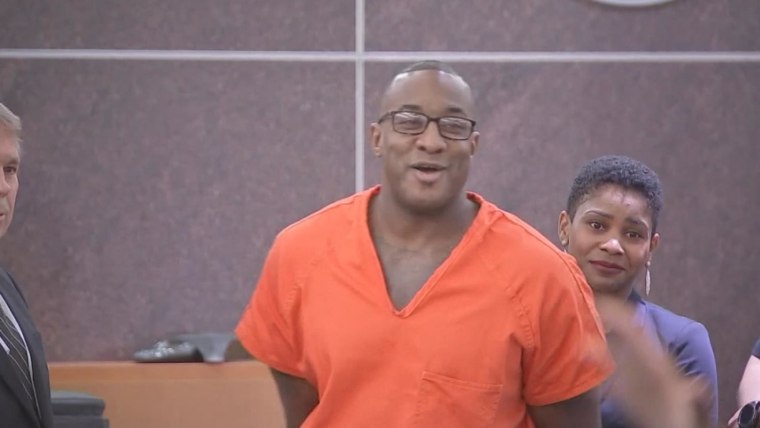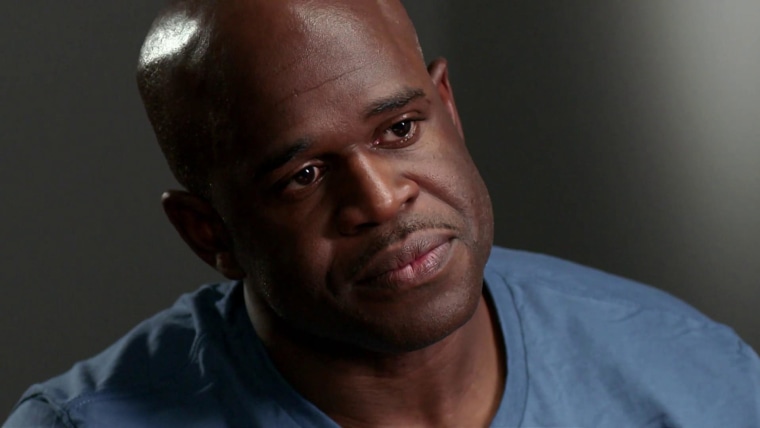In the movies, when a man is exonerated, he walks free. His family wraps him in a long-awaited embrace; his life, long on hold, begins anew.
But for Lydell Grant, acknowledgment that he was wrongfully convicted of murder has only meant purgatory, nearly seven months of it. He is neither free nor behind bars, nor can he restart his life. The laggardly movement of his case for exoneration, which his supporters say only underscores the frustrations and larger belief that systemic racism is ingrained in the justice system, has left him in a different type of cage.
A jury convicted Grant of the 2010 fatal stabbing of a man outside a Houston bar, sending him away for life. Grant spent his days in prison reading about the legal system and writing letters to whoever he thought would take up his cause. Then, in 2019, with the help of a legal team with the Innocence Project of Texas and forensic scientists who used emerging DNA technology, new evidence was collected that convinced Harris County District Attorney Kim Ogg to support a request for bond.
Grant was released from a Texas prison just before Thanksgiving Day.
In December, prosecutors confirmed that re-examined DNA recovered from the fingernails of the victim, Aaron Scheerhoorn, had yielded charges against a new suspect found through an FBI criminal database. Houston Police Chief Art Acevedo said Jermarico Carter of Atlanta, who had a criminal record, confessed to having stabbed Scheerhoorn and was arrested. Acevedo personally, and publicly, apologized to Grant.
Even Harris County prosecutors say they now believe that Grant, 43, was wrongfully convicted and should be a free man.
With all the pieces falling into place and Grant out on a $100,000 bond, a district judge recommended he be exonerated, a necessary step in the process. That gave him confidence that Texas' highest criminal court, which has the final say, would formally declare him innocent.
And yet, that hasn't happened. Once a week, Grant is required to check in with his bail bondsman. He is unable to get a job. And he lives with the fear that if he encounters police, they will pull up his record and throw him back behind bars for the smallest infraction.
"It's like I'm still locked up," he said last week.
Grant's attorney, Mike Ware, said he recently learned that a grand jury indicted Carter three months ago. Ware held up the paperwork during a Zoom call with Grant and NBC News last week.
"I'm not understanding here. Where is the justice at?" Grant asked. "You have a guy in custody, and you have a guy who you thought had done this crime ... and now they're ignoring and dragging me. It's not right. It's a miscarriage of justice."
Ware, executive director of the Innocence Project of Texas, cautioned that the viability of the case against Carter wouldn't make a difference to the Texas Court of Criminal Appeals, which is acting on Grant's exoneration request through a different track.
David Botsford, a criminal defense lawyer in Austin who isn't involved in Grant's case, said he's never seen a "clearer case of actual innocence" than this one.
During Grant's trial, prosecutors used inconclusive DNA testing and eyewitness testimony, a practice that the Innocence Project argues plays a major role in defendants' being wrongfully accused. And Grant, who is Black, had maintained his innocence throughout. He said he had never met the victim, and he produced an alibi, which failed to sway the jury.
Botsford said the state criminal appeals court has an overwhelming caseload. Combined with any delays caused by the coronavirus pandemic and the right of the court's judges to thoroughly review evidence and witness statements to their satisfaction, it's not surprising that Grant has been made to wait months for a resolution, he said. Records show that the court had requested to review Carter's confession in April.
"The court doesn't want to get it wrong," Botsford said.
The Court of Criminal Appeals, the Harris County District Attorney's Office and the Houston Police Department all didn't return calls and emails seeking comment about Grant's case or the case against Carter. It's unclear whether Carter has an attorney.
It's not unheard of for an exoneration to occur relatively quickly.
Michael Morton, a white man who had spent 25 years in prison in the 1986 murder of his wife, was released in October 2011 following the examination of DNA evidence. He was officially cleared two months later, but court records show that it took only one week for the Court of Criminal Appeals to receive case documents and formalize its exoneration decision.
Ware said the system is already stacked against Black men like Grant, which is highlighted by the racial disparities in the number of arrests and in Texas' juvenile justice and prison systems. Ware estimates that thousands of inmates in Texas prisons are innocent.
While Black people make up about 12 percent of the state's population, they account for 34 percent of the prison population, according to data from the Texas Criminal Justice Department as of April.
Download the NBC News app for breaking news and alerts
The longer justice is impeded for Grant, Ware said, the longer he must also wait for compensation for the years he was incarcerated. In Texas, the state pays out $80,000 for each year of wrongful imprisonment and a monthly annuity payment if the person is eligible, and it provides access to state health insurance and tuition credits at state universities.
Ware said he supports further reform so prosecutors who knowingly withhold evidence or engage in misconduct are held to a higher standard.
In recent years, Texas has moved toward sought-after changes in pursuing justice for the innocent. Morton's 2013 case led Rick Perry, then the governor, to sign legislation in Morton's name codifying that prosecutors can't suppress information and that they must open their files to defendants and maintain records of the evidence they disclose.
Ware said Grant's case is one of the strongest examples of actual innocence he's worked on.
But until the criminal appeals court rules, Grant "really can't move on with his life," Ware said.
While he remains out on bond, Grant is looking forward to his future. He told NBC News that he is grateful for his family in Houston, as well as lawyers like Ware and the forensic scientists who never gave up on him. He's planning for a career in audio engineering and film production, and he enrolled at American InterContinental University in Houston. He expects to start classes in July.
He told Ware during their Zoom call that he will continue fighting for justice for himself — and anyone else who might need his help.
"Until death takes me home," Grant said, "I have a voice, and it's going to be heard."
"still" - Google News
June 24, 2020 at 06:09PM
https://ift.tt/2BExAIc
Texas man released on DNA evidence still not exonerated after new suspect confesses to murder - NBC News
"still" - Google News
https://ift.tt/35pEmfO
https://ift.tt/2YsogAP
Bagikan Berita Ini
















0 Response to "Texas man released on DNA evidence still not exonerated after new suspect confesses to murder - NBC News"
Post a Comment